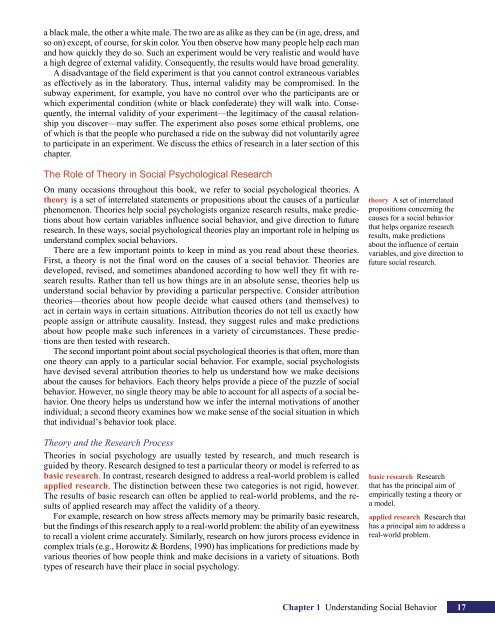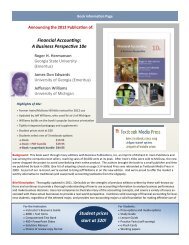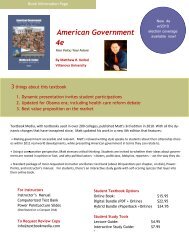Book Information / Sample Chapter(s) (PDF) - Textbook Media
Book Information / Sample Chapter(s) (PDF) - Textbook Media
Book Information / Sample Chapter(s) (PDF) - Textbook Media
- No tags were found...
Create successful ePaper yourself
Turn your PDF publications into a flip-book with our unique Google optimized e-Paper software.
a black male, the other a white male. The two are as alike as they can be (in age, dress, andso on) except, of course, for skin color. You then observe how many people help each manand how quickly they do so. Such an experiment would be very realistic and would havea high degree of external validity. Consequently, the results would have broad generality.A disadvantage of the field experiment is that you cannot control extraneous variablesas effectively as in the laboratory. Thus, internal validity may be compromised. In thesubway experiment, for example, you have no control over who the participants are orwhich experimental condition (white or black confederate) they will walk into. Consequently,the internal validity of your experiment—the legitimacy of the causal relationshipyou discover—may suffer. The experiment also poses some ethical problems, oneof which is that the people who purchased a ride on the subway did not voluntarily agreeto participate in an experiment. We discuss the ethics of research in a later section of thischapter.The Role of Theory in Social Psychological ResearchOn many occasions throughout this book, we refer to social psychological theories. Atheory is a set of interrelated statements or propositions about the causes of a particularphenomenon. Theories help social psychologists organize research results, make predictionsabout how certain variables influence social behavior, and give direction to futureresearch. In these ways, social psychological theories play an important role in helping usunderstand complex social behaviors.There are a few important points to keep in mind as you read about these theories.First, a theory is not the final word on the causes of a social behavior. Theories aredeveloped, revised, and sometimes abandoned according to how well they fit with researchresults. Rather than tell us how things are in an absolute sense, theories help usunderstand social behavior by providing a particular perspective. Consider attributiontheories—theories about how people decide what caused others (and themselves) toact in certain ways in certain situations. Attribution theories do not tell us exactly howpeople assign or attribute causality. Instead, they suggest rules and make predictionsabout how people make such inferences in a variety of circumstances. These predictionsare then tested with research.The second important point about social psychological theories is that often, more thanone theory can apply to a particular social behavior. For example, social psychologistshave devised several attribution theories to help us understand how we make decisionsabout the causes for behaviors. Each theory helps provide a piece of the puzzle of socialbehavior. However, no single theory may be able to account for all aspects of a social behavior.One theory helps us understand how we infer the internal motivations of anotherindividual; a second theory examines how we make sense of the social situation in whichthat individualʼs behavior took place.Theory and the Research ProcessTheories in social psychology are usually tested by research, and much research isguided by theory. Research designed to test a particular theory or model is referred to asbasic research. In contrast, research designed to address a real-world problem is calledapplied research. The distinction between these two categories is not rigid, however.The results of basic research can often be applied to real-world problems, and the resultsof applied research may affect the validity of a theory.For example, research on how stress affects memory may be primarily basic research,but the findings of this research apply to a real-world problem: the ability of an eyewitnessto recall a violent crime accurately. Similarly, research on how jurors process evidence incomplex trials (e.g., Horowitz & Bordens, 1990) has implications for predictions made byvarious theories of how people think and make decisions in a variety of situations. Bothtypes of research have their place in social psychology.theory A set of interrelatedpropositions concerning thecauses for a social behaviorthat helps organize researchresults, make predictionsabout the influence of certainvariables, and give direction tofuture social research.basic research Researchthat has the principal aim ofempirically testing a theory ora model.applied research Research thathas a principal aim to address areal-world problem.<strong>Chapter</strong> 1 Understanding Social Behavior 17













